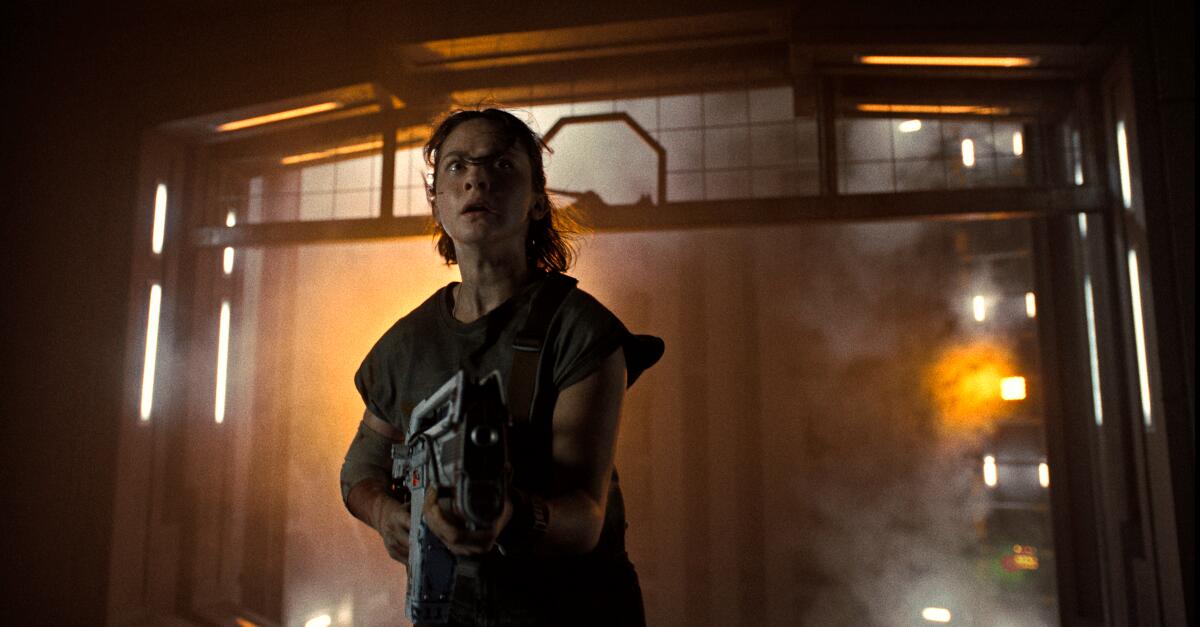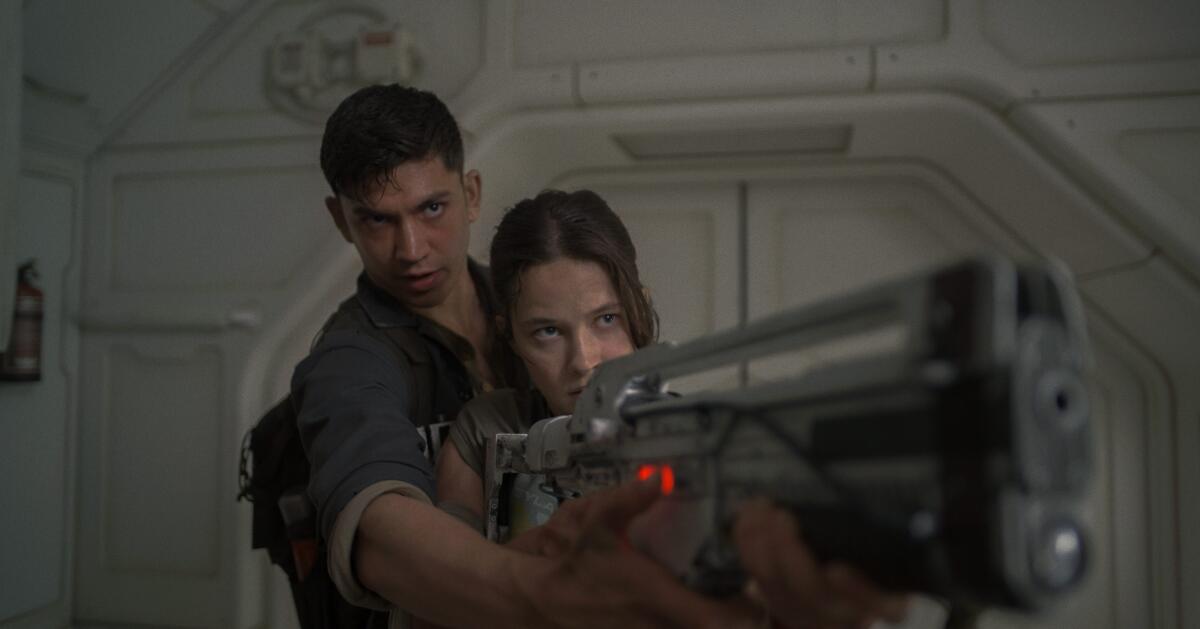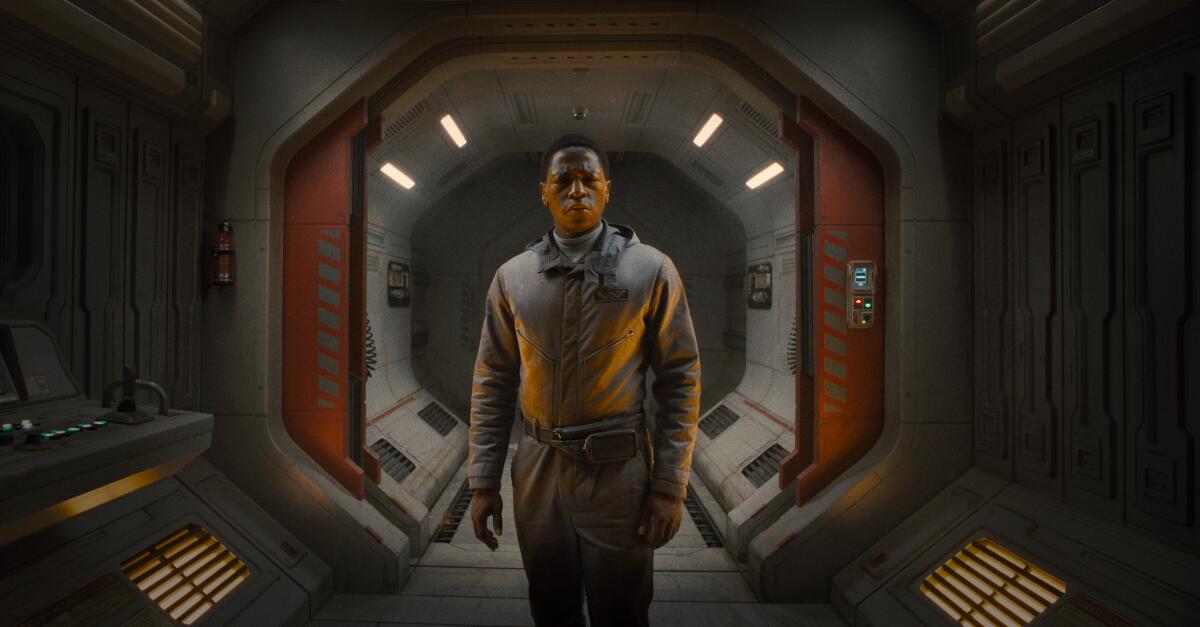Review: Bringing things back to basics, ‘Alien: Romulus’ leans into the horror and the goo

- Share via
The beauty of the “Alien” franchise is that it has always allowed room for distinctive filmmakers to play with their own aesthetics and themes. Ridley Scott’s taut, philosophical space-thriller “Alien” gave way to the sweaty, militarized machismo of James Cameron’s “Aliens.” David Fincher brought industrial Soviet aesthetics and psychosexual tension from his Madonna music videos to the stylish “Alien 3” (though he disavowed his feature debut); even the darkly whimsical French auteur Jean-Pierre Jeunet put his quirky stamp on “Alien: Resurrection,” before Scott himself returned for the bloody, brooding prequels “Prometheus” and “Alien: Covenant.”
With “Evil Dead” and “Don’t Breathe” director Fede Alvarez now at the helm, it’s no surprise that his “Alien: Romulus” is a contained slasher flick drenched in goopy viscera, in which a group of scrappy youths is hunted down by an unknowable monster.
Co-written by Alvarez and Rodo Sayagués, the screenplay for “Alien: Romulus” is ruthlessly efficient while touching on recognizable themes from the series: pregnancy, female strength and the clash between human and artificial intelligence.
After rebooting ‘Evil Dead’ and following up with ‘Don’t Breathe,” the filmmaker returns with ‘Alien: Romulus,” which he approached as a Ridley Scott fan first.
One could argue that “Alien” movies are like pizza — they’re good even when they’re not so great — and aside from a few head-scratching choices that will no doubt inspire reams of think pieces, “Alien: Romulus,” with its thrilling tactility and appealingly plucky cast, is a very enjoyable pie.
Cailee Spaeny, recently of “Priscilla” and “Civil War,” steps into Ellen Ripley’s Reeboks as our hero, Rain, who wants only one thing: to see the sun. She’s trying to make her way off the Jackson Mining Colony with her “brother,” a synthetic (or droid) named Andy (David Jonsson), and transfer to the farming planet of Yvaga. But the Weyland-Yutani corporation keeps moving the goalposts and she hasn’t fulfilled her quota of hours in the mine. Knowing that the company will never do right by her, she joins up with a group of friends to scavenge for cryopods in an abandoned ship floating overhead, in hopes they can make their way to Yvaga themselves.

A group of teens robbing a seemingly deserted house, unaware of what dangers await them? This sounds a lot like Alvarez’s “Don’t Breathe.” Naturally, the ship, recently ravaged by similar events to “Alien,” is crawling with facehuggers and xenomorphs, and the friends are separated and picked off, bad decisions are made and all manner of unholy creatures come bursting forth from various bodily cavities.
At the center of the story is the relationship between Rain and Andy. She wrestles with the idea of leaving him behind when considering their plans, but then a security upgrade to his software, which allows him to access different parts of the ship (its two halves are named for Romulus and Remus, the twins of Rome), reboots him into something colder and more calculating. Initially programmed by Rain’s late father to do what’s best for her (and tell dad jokes), Andy’s new directive becomes finishing the mission for the company.
This doesn’t happen in a vacuum. Andy comes under the sway of a very persuasive new character left behind from the previous massacre, a chewed-up, half-destroyed synthetic called Rook with a surprisingly familiar appearance. With a performance constructed from a voice actor and facial scans, Alvarez has brought back to life a memorable but deceased actor from “Alien.”

The trend of reanimating dead stars in “lega-sequels” or “interquels” (the ghost of Harold Ramis in “Ghostbusters: Afterlife”; Peter Cushing in “Rogue One”) is both off-putting and ethically questionable, especially considering the ongoing fight of actors to control their own image against the looming threat of AI. Those questions aside, if the addition works at all in “Alien: Romulus,” it’s because they aren’t aiming for realism with this mangled droid. Still, it nags, especially given Alvarez’s commitment elsewhere to grungy practical sets and props. He’s also already got a fantastic standout performance from Jonsson, who alternates between wounded puppy dog and shrewd corporate proxy.
There are other surface pleasures to enjoy in “Alien: Romulus,” including the stunningly rich cinematography by Galo Olivares and the scuffed-up and worn interiors lit with glowing reds, shiny with extraterrestrial mucus. Benjamin Wallfisch’s score keens and groans ominously, sometimes dipping into synthy electronic moments.
Director Ridley Scott joined Times film critic Justin Chang for a conversation about “Alien,” the Week 4 winner of the Ultimate Summer Movie Showdown, He recalled casting Sigourney Weaver and the influence of “Star Wars.”
At the center of it all is Spaeny‘s Rain, the locus of the film’s intelligence. Her empathy complicates things, but her ability to read and interpret situations bests any synthetic calculation. Short, compact and young, Spaeny does not convey the lithe power of Sigourney Weaver or Katherine Waterston, nor the steeliness of Noomi Rapace, all of whom have taken up weapons against the xenomorphs in past “Alien” films.
But Alvarez gives Spaeny her hero moments, whether in her care of her comrades or destroying an invasive species, and she expresses the inner strength and utter determination to survive required of an “Alien” franchise installment. Sometimes, that demonstration of sheer humanity and grit is all that’s required to make one of these films sing.
Katie Walsh is a Tribune News Service film critic.
'Alien: Romulus'
Rated: R, for bloody violent content and language
Running time: 1 hour, 59 minutes
Playing: In wide release Friday, Aug. 16
More to Read
Only good movies
Get the Indie Focus newsletter, Mark Olsen's weekly guide to the world of cinema.
You may occasionally receive promotional content from the Los Angeles Times.











